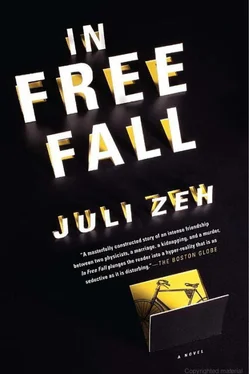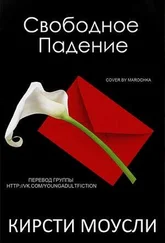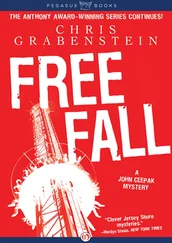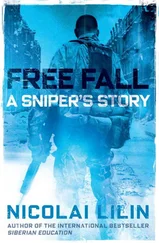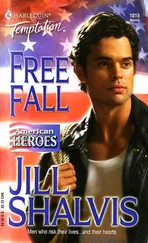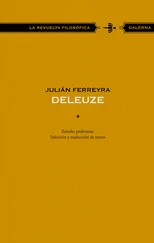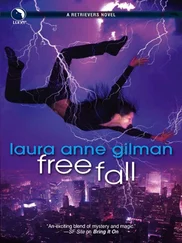“Do you know what jealousy is?” Maike asks.
“From hearsay,” says the detective.
Two years passed. The young man showed off his bruises proudly. When the fighting could escalate no further, he set an ultimatum. It was either him or the paintings.
“The artist chose love,” Schilf guesses.
“Wrong,” Maike says.
The artist chose art. He sent his lover packing and expressed his despair in color, creating Blackmail I and II . After that, his muse left him, too, and followed his boyfriend.
“He never painted anything of note after that,” Maike says. “Sometimes love is a kind of destructive rage.”
She raises her little finger to the corner of her eye as if trying to brush something away. Neither of them feels that the next sentence is their responsibility. While Maike looks down at her feet, the orchestra of thoughts in Schilf’s head plays a polyphonic symphony of questions to ask and statements to make. Philosophical remarks about the architecture of fate. Queries about the price of the paintings that he is supposed to be interested in buying. Banalities about breeding parakeets. When he finally opens his mouth, he has assembled the most deadly collection of words imaginable.
“How are you coping with Ralph Dabbelink’s death?”
Maike jumps up almost before the name is out of his mouth. She looks around as if she has come in here by mistake and stumbled into a conversation among strangers.
“How do you know Ralph?”
“From the newspapers.”
“Did they say I was friends with him?”
“I know that from Sebastian.”
“You’re lying!” Maike shouts.
She is right, for it was not Sebastian who told the detective about Maike’s friendship with Dabbelink, but Maike herself, or, to be precise, her racing bike, combined with the paleness of her cheeks, on which her tan looks artificial. She has pushed both hands into her pockets, and is kneading the fabric of her trousers.
“Who are you?”
“I’m sorry.”
“Please go.”
Maike walks over and looks directly down at him. Schilf rises clumsily. He can see that she is struggling for composure and losing it. Her self-control is falling away like a broken facade; an expression of naked fury is coming to the fore. When she lifts a pair of touchingly balled fists, Schilf does not feel that her aggression is directed at him. It is Sebastian’s chest that she is punching, Sebastian’s skin that she is digging her nails into. It is also his arm that she is holding on to, and it is even his voice that makes comforting noises. They sink into an embrace that the detective has not sought. He feels the fat of his stomach yielding to Maike’s weight, the softness of his body. It takes only seconds for Maike to push him away from her and re-create some space. The redhead looks over, indifferent as a machine that has not been programmed to deal with occurrences of this kind.
“I’m here to warn you.”
The detective hears the sweet whispering of a rejected lover; it comes from his own mouth. Quickly he pulls back the hands that for some unknown reason are reaching toward Maike.
“You have to stand by Sebastian no matter what happens. He…”
“We’ll see,” Maike says.
She wipes moisture from her face and smooths her hair. In another five seconds, she will have changed back into the untouchable gallery owner, curator of strangers’ fates, saleswoman of sorrow turned into paintings. Three more seconds.
“Don’t make a mistake. Leave everything else to me.”
“Get lost.”
She does not shout, but turns the words into a polite request. The detective obeys. The doorbell chimes the “Ode to Joy.” Maike goes to the window and watches him as he walks down the lane, taking small steps and lifting his knees up high as if to avoid invisible obstacles. He takes an intolerably long time to reach the corner, where he does not turn, but simply dissolves into air.
RITA SKURA IS HAVING A SHITTY DAY, one of those days that get worse and worse with every passing minute. At around two o’clock in the afternoon, she sinks down into one of the armchairs that are on every floor for anyone feeling faint. Even with her eyes closed she can see the figures in dressing gowns shuffling down corridors, and hear the slapping of the slippers dangling from bare feet. All morning she has been surrounded by a cloud of disinfectant that ought to spread cleanliness, but which merely reminds her of flaking scalps, bedsores, and open ulcers. The light of the fluorescent tubes pursues Rita just as doggedly. It turns even healthy faces into grimaces of misery, and makes the summer’s day outside look like a mocking stage-set, no more real than an Alpine panorama on a billboard advertising chocolate.
Rita Skura is young enough to think that good health is simply a matter of having the right attitude. She is a stranger to a place like this. She has always found the idea of people drilling bits of metal into each other, or cutting each other up into bloody sections, more tolerable than the exhibits of decline that accompany what they call a natural death. At such an endpoint to the glory of human life, the following question arises: Why does someone like Rita Skura devote all her energy to hunting down people who have done nothing more than replace this tortuously slow decline with a quick exit? No one can put the real criminals—illness, mortality, and the fear of both—behind bars.
Thoughts like these do not pass through Rita’s mind as she leans back in a soulless, artificial leather armchair and pulls her cardigan tight around her—of course not, she is not the type to think like this. She is worrying instead about wasting time. She has not been in the business long, but she knows immediately when she is not making progress. And if Rita hates anything, it is dead ends.
On this wasted day, her only success so far has come from brazenly taking Medical Director Schlüter by surprise and forcing him into a brief interview. Early that morning, she swept past reception confidently, took the elevator to the cardiology department, and hid behind an aluminum cupboard in the corridor. When the medical director appeared during his rounds, followed by a flock of white coats, she stepped out in front of him at the door to the nearest patient’s room. Schlüter did not seem surprised. Without saying a word, he grabbed her sleeve. His familiarity with body parts not his own was evident in the firmness of his grip and the indifference he showed to Rita’s anatomical particularities. He dragged her through a glass door that he shut behind them. The senior registrars and the nurses locked outside immediately started up a conversation, looking through the glass with the studied indifference of goldfish.
Rita and Medical Director Schlüter found themselves in a section of the utility passage, surrounded by buckets, cleaning carts, and discarded wheelchairs. Unusually for Rita, she hardly got a word in. Schlüter did not raise his voice, and his lecture lasted less than five minutes.
The police had been plaguing him for two weeks—him, who had taken the Hippocratic oath not just as a matter of form but to his very heart—with the most absurd accusations. He was not sure if a thick-skulled civil servant such as Rita was able to appreciate what it was like to continue carrying out his very complicated duties under these circumstances. Some patients were refusing to take medication because they were afraid that they would be poisoned by doctors testing unauthorized pills on behalf of the pharmaceutical industry. Even less could Rita imagine that the gruesome death of his anesthetist affected him, Schlüter, most of all. He would not put up with it any longer. If Rita and her friends didn’t immediately stop treating him like a murderer in public, they would find themselves charged with libel and facing a massive police scandal. He did not think it necessary to list the influential persons he played golf with on a regular basis.
Читать дальше
